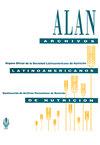Consumo de alimentos, estado nutricional antropométrico, actividad física y motivaciones de vegetarianismo en adultos venezolanos
IF 0.5
4区 医学
Q4 NUTRITION & DIETETICS
引用次数: 0
Abstract
Introduction: vegetarian diets are diets that avoid animal meat, it includes ovolactovegetarian and vegan diets, among other plant-based variants. Objective: to characterize food consumption, anthropometric nutritional assessment, physical activity level and motivations in a sample of vegetarian adults from the Capital District, Yaracuy and Carabobo states of Venezuela. Materials and methods: 51 adults were evaluated, 23.5% vegan and 76.5% ovo-lacto vegetarian, aged between 18 and 65 years. A 24-hour dietary recall was carried out, indicators of dimension (BMI and waist circumference) and body composition (muscle area and percentage of fat) were taken, the long IPAQ instrument of physical activity was applied and it was asked about the main motivation to follow these diets. Results: the diet was deficient in calories (60.8%), low in carbohydrates (72.5%) and fats (58.8%), and high in proteins (43.1%) and dietary fiber (70.6 %). The anthropometric nutritional assessment of the individuals resulted in an adequate weight (62.7%), average muscularity (51%) and fat (68.6%), and low risk according to waist circumference (86.3%). The level of physical activity that prevailed were the moderate and intense categories with 39.2% each. The majority decided to follow the vegetarian diet for health reasons 72.5%. Conclusions: the majority of the study group, despite having an unbalanced diet (low in carbohydrates and fats, but high in proteins and fiber), presented an anthropometric nutritional status and levels of physical activity within acceptable ranges委内瑞拉成年人的食物消费、人体营养状况、体育活动和素食动机
简介:素食是指避免食用动物肉的饮食,包括蛋乳素食和纯素食,以及其他植物性饮食。目的:对委内瑞拉首都区、亚拉库州和卡拉波波州的素食成年人样本的食物消费、人体测量营养评估、体育活动水平和动机进行表征。材料和方法:对51名年龄在18至65岁之间的成年人进行了评估,其中23.5%为素食主义者,76.5%为蛋乳素食主义者。进行了24小时的饮食回忆,测量了尺寸指标(BMI和腰围)和身体成分(肌肉面积和脂肪百分比),应用了长期IPAQ体育活动工具,并询问了遵循这些饮食的主要动机。结果:该饮食热量不足(60.8%),碳水化合物(72.5%)和脂肪含量低(58.8%),蛋白质(43.1%)和膳食纤维(70.6%)。对这些人的人体测量营养评估结果显示,他们的体重充足(62.7%),平均肌肉发达程度(51%)和脂肪含量(68.6%),腰围风险较低(86.3%)。主要的体育活动水平为中等和高强度,各占39.2%。大多数人出于健康原因决定素食,占72.5%。结论:尽管研究组的大多数人饮食不均衡(碳水化合物和脂肪含量低,但蛋白质和纤维含量高),但他们的人体营养状况和体育活动水平在可接受的范围内
本文章由计算机程序翻译,如有差异,请以英文原文为准。
求助全文
约1分钟内获得全文
求助全文
来源期刊
CiteScore
0.50
自引率
0.00%
发文量
31
期刊介绍:
Archivos Latinoamericanos de Nutrición (ALAN) is the official publication of the Sociedad Latinoamericana de Nutición (SLAN), for the dissemination of knowledge in the fields of food and nutrition, principally throughout the American Hemisphere. Articles in Spanish, English, Portuguese and French are accepted, both from the Society members and from nonmembers, in the following categories: 1. General articles (critical scientific reviews); 2. Research articles (originals); 3. Papers in applied nutrition (analytical results from intervention programs and discussion of reconmendations of practical application), and 4. Letters to Editor (short comments of general interest or about scientific facts and results previously published in Archives).

 求助内容:
求助内容: 应助结果提醒方式:
应助结果提醒方式:


